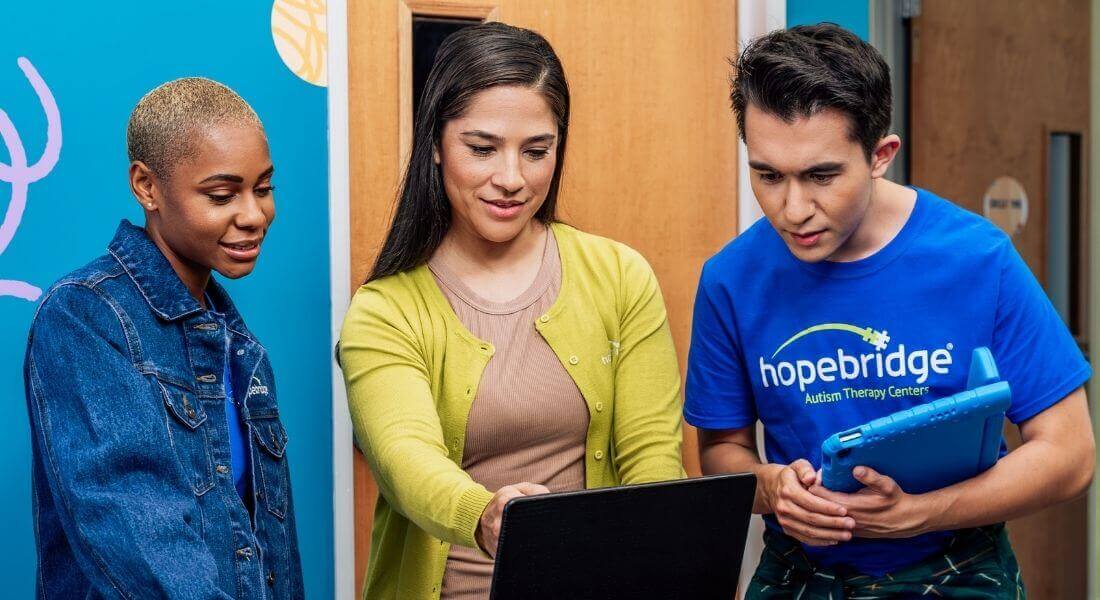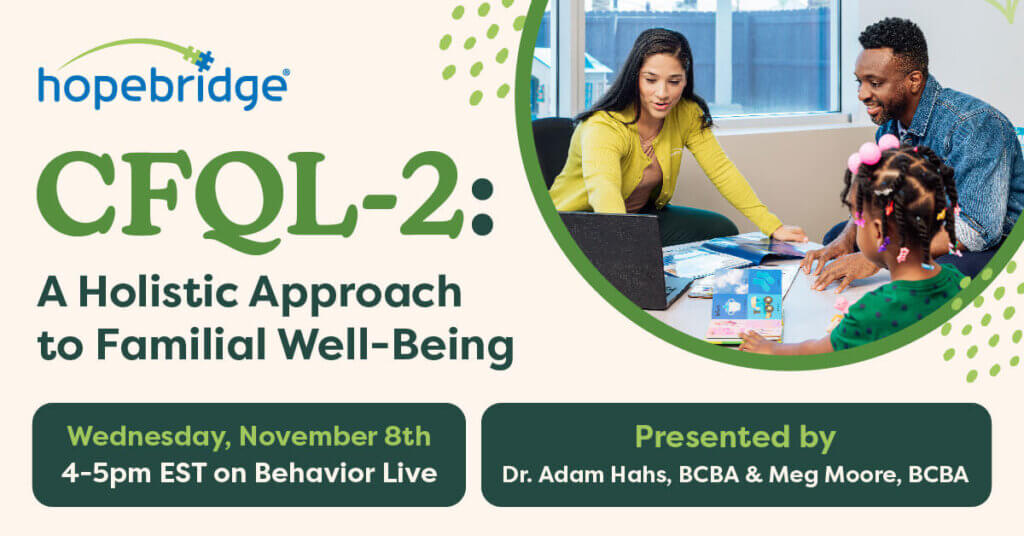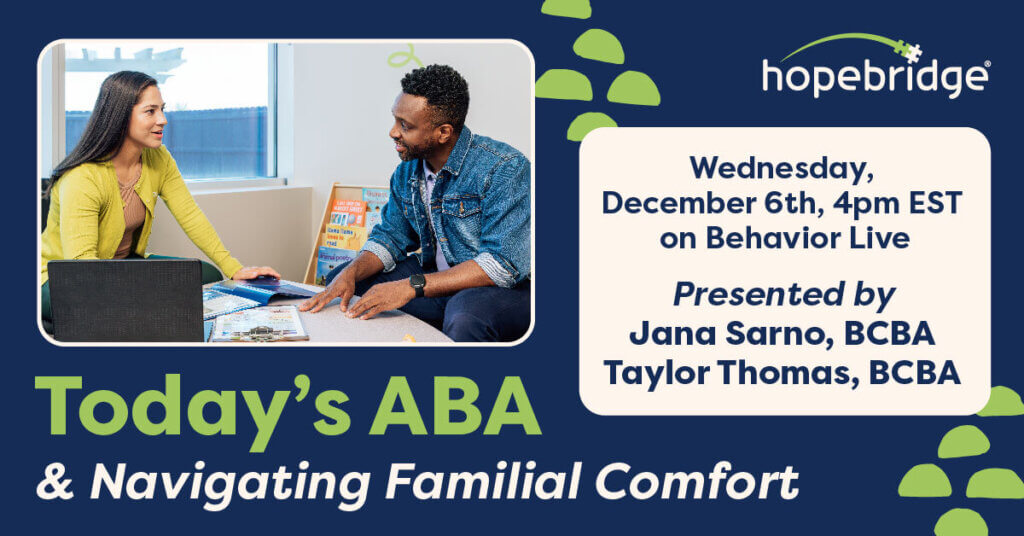Hopebridge Training Series Provides BCBAs with Structure and Support to Navigate Effective and Compassionate Conversations with Families
November 09, 2023
November 09, 2023

Working in – or participating in – applied behavior analysis (ABA) should never feel like a silo. At Hopebridge, we aim for our children, families and clinicians to feel empowered by the collaboration it takes to build and implement meaningful treatment plans. We feel privileged to serve alongside families and take part in their life-changing outcomes, but for this type of purposeful programming to take place, it requires effective communication and partnership amongst everyone involved.
Unfortunately, while behavior analysis graduate programs offer a wealth of knowledge, the application of specific assessments and education around how to engage in compassionate conversations is not readily taught1. In response to clinician feedback and the needs of our field, the Hopebridge clinical leadership team designed a training series for board certified behavior analysts (BCBA) aimed at filling in these gaps within their broader education.
“Similar to our HRE at HB continuing education series – which served as a popular resource for our BCBAs – we believe Hopebridge’s clinical philosophy will really shine through with these next sessions,” said Hopebridge Chief Clinical Officer Jana Sarno. “Our goal is to deliver applicable training that meets clinicians where they are while also taking them where they want to go in their clinical practice.”
Offered internally and exclusively for our team members, Hopebridge BCBAs can receive free continuing education units (CEU) by participating in the following curated training opportunities:
CFQL-2: A Holistic Approach to Familial Well-Being on 11/8
Today’s ABA: Navigating Familial Comfort on 12/6

November 8, 2023
The first training, “CFQL-2: A Holistic Approach to Familial Well-BeingCFQL-2: A Holistic Approach to Familial Well-Being,” is led by Hopebridge Chief Science Officer Adam D. Hahs, Ph.D. (who also taught Hopebridge’s acclaimed PEAK Training) and Clinical Trainer Meg Moore.
Using the Child and Family Quality of Life-2nd edition (CFQL-2), this session is great for clinicians who want to further build their repertoires around crafting holistic goals for families based on caregiver input and the results of our assessments.
The focus of the training is two-fold. The instructors will first expand on interviewing skills specific to the assessment with the goal that listeners learn to skillfully explain the “why” behind each section of the measure to families. The interview portion will also include points on knowing when and how to present follow-up questions to gather valuable information that will allow the care team to serve the child and family in a more holistic and individualized way. The next section pivots from assessment to action and focuses on using the information and data collected in the interview to create meaningful family guidance targets for the child’s plan of care (POC).
“The goal of this tool is to improve the quality of life for the child and family, both individually and as a whole. The aim of the training is to teach our clinicians how to do exactly that,” said Meg.
One of many tools within the Hopebridge Assessment Platform, the CFQL-2 is a required assessment at Hopebridge, but may not be used as often in other ABA settings. Introducing the CFQL-2 is part of Hopebridge’s continued focus on progressive, compassionate care2, and this training takes it the next step forward to build out its impact.
“The CFQL-2 provides the data that we have not previously had access to when creating goals for the child and family. With this tool, the question shifts from ‘What does the assessment tell us you need?’ to ‘What do you tell us you need?’ This is an important distinction,” said Meg.
The CFQL-2 is an important resource within the Hopebridge toolbox for driving compassionate care. It helps clinicians dive into the ways therapy can help increase joy for the child and family through their interactions with their environment and each other.
“This training is really beneficial because it’s highly applicable; not just a high-in-the-sky concept. Adam and Meg work through practical scenarios to provide BCBAs with the data, best-use situations and where they can go with the programming,” said Jana. “Clinicians will leave the training with resources and applications that should feel similar to their caseloads.”

December 6, 2023
The second session – “Today’s ABA: Navigating Familial Comfort” – is led by the same team that hosted the HRE at HB series, Jana and Director of Functional Assessment Taylor Thomas. It aims to help clinicians in having compassionate conversations around addressing problem behavior and building durable skill repertoires.“
This training is beneficial for clinicians who may have a difficult time explaining what a BCBA does on a daily basis, or for those who want to address a family’s concerns around ABA in general. The session intends to equip behavior analysts with points of distinction and information about the Hopebridge care model so they can best navigate these conversations to increase a family’s comfort with ABA.
“We have shifted – and continue to shift – our clinical philosophy over the last two years. We know what is happening in the larger community and what parents may hear about ABA,” said Jana. “The goal of this training is to help our BCBAs have honest, listening-forward conversations alongside families about our philosophy.”
Through the training, clinicians will take away the skills so they can let families know how Hopebridge is different, how our team takes a family’s input into consideration, what our centers look like and how we craft goals with the family, rather than for the family. As a result, BCBAs should able to meet a family where they are at while also having the structure and support to dive into these nuanced conversations. They will be able to listen to their concerns, validate them, and provide a compassionate and educated message forward.
This particular training stemmed from the request of a fellow BCBA. After diving into some of Hopebridge’s other trainings, such as the series on Autism and Co-Morbid Conditions, Hopebridge Georgia BCBA Melissa Lewandowski shared her interest in other topics with the leadership team.

“Navigating the world of ABA can be an overwhelming and confusing experience for some of our families, especially those we meet in initial diagnostic evaluations. With a plethora of information at their fingertips, it can lead to more questions than answers,” said Melissa.
“I firmly believe that navigating familial relationships in a compassionate and empathetic manner is a timely and extraordinarily important topic. I always walk away from Hopebridge-led CEU events with a greater understanding of how to provide the utmost compassionate care and support for our children and their families, and I am especially looking forward to this topic.”
“The benefit of hosting these trainings internally at Hopebridge is that we can pull in our templates and talk about where our resources live. Our BCBAs will not necessarily receive the same benefit via external trainings because, while still valuable, it may be tougher to realize how to implement it somewhere else without the same resources. By offering these opportunities in house to our clinicians, we can make sure that we specifically reference all of the documents that are available to them,” said Jana.
These trainings are just a piece of the development opportunities available for clinicians to learn and grow at Hopebridge, which ultimately lead to better care and better outcomes for our children and families. From mentorship for BCBAs through the Bridge Program to a BCBA Career Pathway that paves the way for structured, competency-based advancement, BCBAs, RBTs and other team members will find something that suits their own goals while working towards those of their children.
If Hopebridge’s mission and model sounds like the ABA you dream of practicing as a clinician while moving forward within your own career, check out our open positions in locations across the country.
Or, if you are a caregiver would like to find out more about Hopebridge’s compassionate care and clinical excellence can benefit your child, contact us to learn more about what our autism testing and personalized therapy programs can do for your family.
*Informed consent was obtained from the participants in this article. This information should not be captured and reused without express permission from Hopebridge, LLC. Testimonials are solicited as part of an open casting call process for testimonials from former client caregivers. Hopebridge does not permit clinical employees to solicit or use testimonials about therapeutic services received from current clients (Ethics Code for Behavior Analysts 5.07-5.08; BACB, 2020). Hopebridge does not provide any incentives, compensation, or renumeration for testimonials provided by a former client or client caregiver.
Autism Therapy
September 19, 2018
What Does a Day at Hopebridge Look Like for your Kiddo? - Ask Kim Video Series
Autism Therapy
September 22, 2023
Why Focusing on Self-Advocacy During Therapy is Important
Autism Therapy
January 19, 2026
Leading Pediatric Therapy for 20 Years, Hopebridge Expands Impact in 2025